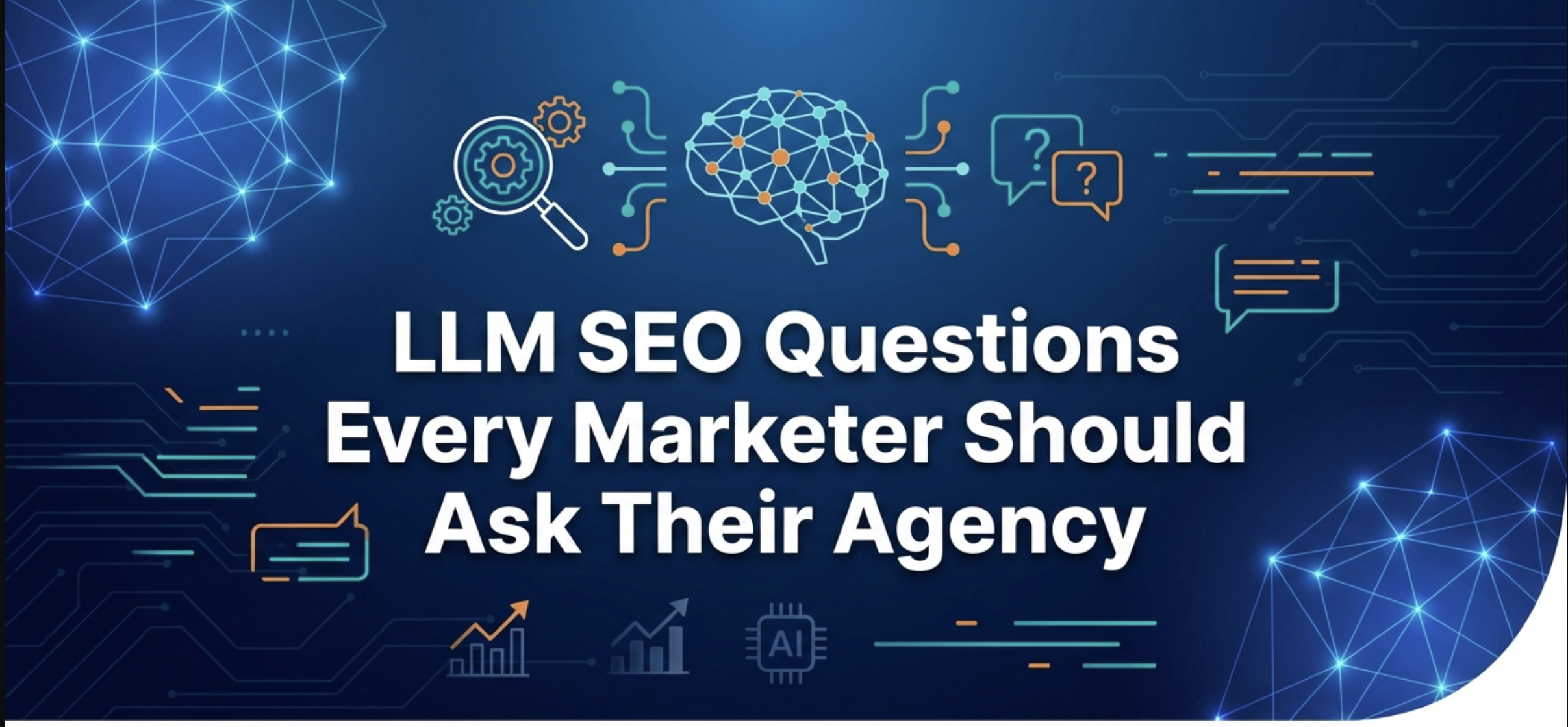
LLM SEO Questions Every Marketer Should Ask Their Agency
Introduction
TL;DR
- LLM SEO goes beyond prompts—it’s about structured, entity-aware optimization.
- Ask agencies how they measure visibility in Google SGE and Bing Copilot.
- Demand proof of editorial oversight and schema implementation.
- Good LLM SEO ties visibility to conversions, not vanity metrics.
- Transparency and iteration matter more than automation.
1) What exactly do you mean by LLM SEO?
Agencies often blur LLM SEO with “AI writing.” True LLM SEO is about optimizing for AI-driven discovery, where models summarize and cite trusted entities. For background, see our primer What Is AI SEO: 2025 Guide.
Checklist
- Can they define entity-based optimization?
- Do they mention Google SGE and Bing Copilot?
- Can they show structured data examples?
What to do
- Ask for their LLM SEO workflow in one page.
- Request examples designed for AI answer surfaces.
- Compare their claims with Google’s official SGE overview.
2) How do you test and measure LLM visibility?
Traditional keyword tracking doesn’t reflect how models summarize results. Competent agencies track AI answer inclusion using prompt-based tests in Bing Copilot and Google SGE—similar to auditing featured snippets but for LLM outputs.
Signals
- Mention of AI response tracking.
- Entity recall metrics.
- Updates synced with Copilot releases.
What to do
- Request their LLM visibility template.
- Confirm monthly audits on both SGE and Bing.
- Ask for regional visibility snapshots (India vs. U.S.).
3) Who writes and reviews AI-assisted content?
If your agency fully automates content creation, that’s risky. Fact-checking and editorial review ensure authority. Ferventers’ AI SEO services emphasize a human-in-the-loop model—AI assists, but editors finalize.
Watch for
- “100% AI-written” promises (red flag).
- No mention of human review.
- Lack of style guide or version control.
What to do
- Ask who reviews outputs.
- Check their editorial policy.
- Demand fact-source validation logs.
4) How do you map entities for LLM understanding?
Entity mapping is the backbone of LLM SEO. Strong agencies create graphs connecting your brand to relevant topics to improve model recall.
Tips
- Ask for a visual of your entity map.
- Ensure they use schema.org types where applicable.
- Check if they enrich metadata with contextual connections.
What to do
- Request an entity coverage report.
- Verify integration with your existing SEO stack.
- Compare with semantic tools like SurferSEO.
5) What data sources train your LLM optimization strategy?
Ask where their models and insights originate. Top agencies test on live models (GPT‑4, Claude, Bing Copilot) and cross-check with Google’s SGE updates. If they reference outdated GPT‑3 data, that’s a problem.
Ask for
- Version logs and test dates.
- Screenshots from model queries.
- Documentation for each revision.
What to do
- Confirm they use live models.
- Ask for notes on regional SERP differences.
- Ensure they test Bing and Google environments.
6) How do you align LLM SEO with conversion goals?
Visibility only matters if it drives results. The best agencies tie LLM impressions to leads or demo conversions and connect analytics or CRMs to attribute AI answer appearances.
Checklist
- AI traffic separated from organic.
- Conversion data tied to model visibility.
- Integrated dashboards showing performance shifts.
What to do
- Request LLM-to-conversion tracking setup.
- Ask for proof of performance deltas.
- Align content scoring with ROI metrics.
7) What happens when this doesn’t work?
Sometimes, experiments flop—AI models may skip smaller brands or over-index big names. A solid agency admits this and adjusts with fallback strategies like branded search reinforcement and backlink improvements.
Signals
- Case studies of failed tests and recovery.
- Honest discussion of limitations.
- Regular iteration cycles.
What to do
- Ask for one “failure example.”
- Verify adaptive response strategy.
- Track quarterly outcome reviews.
8) How transparent is your AI workflow?
If an agency says their process is “proprietary,” be cautious. You deserve visibility into prompts, review steps, and QA. Transparent teams provide workflow documents, prompt logs, and version histories.
Checklist
- Named editors and reviewers.
- Versioned AI prompt sheets.
- QA documented with timestamps.
What to do
- Request their AI content SOP.
- Ask who signs off before publish.
- Make workflow transparency part of your contract.
Conclusion
Quick Checklist
- Ask for definitions and visibility proof.
- Verify human review and schema use.
- Measure performance, not buzzwords.
FAQ
What is LLM SEO in simple terms?
It’s optimizing content for AI-driven search engines like Google SGE and Bing Copilot so your brand appears in generated summaries.
How is LLM SEO different from traditional SEO?
Traditional SEO targets ranking pages. LLM SEO targets model recall—how your brand is represented in AI-generated answers.
Do I need to rebuild my content?
No. Start by mapping entities, updating schema, and testing prompts that mirror user intent.
Found this post insightful? Don't forget to share it with your network!

The Ferventers Team
2025-11-23
10 min read
The Ferventers Team
Table of Contents
- •
- •
- •
- •
- •
- •
- •
- •
- •
- •
- •
- •
- •
